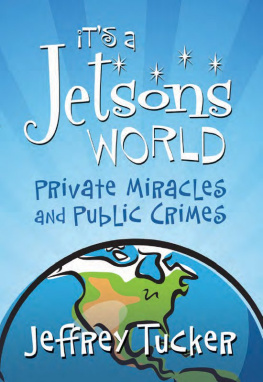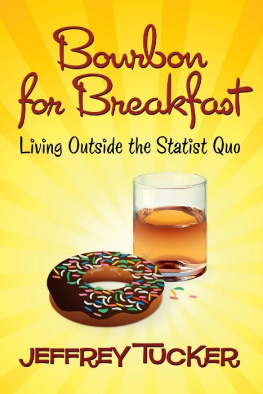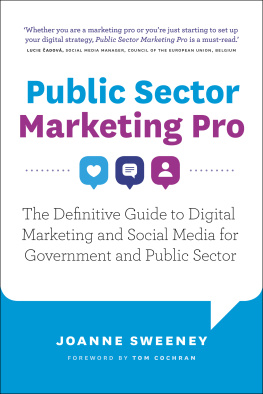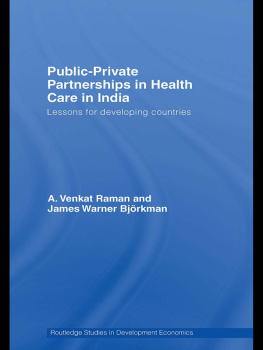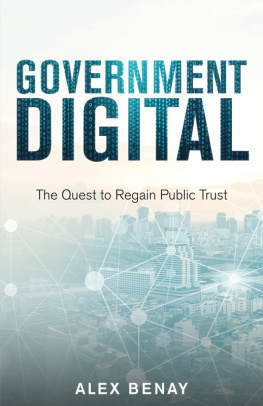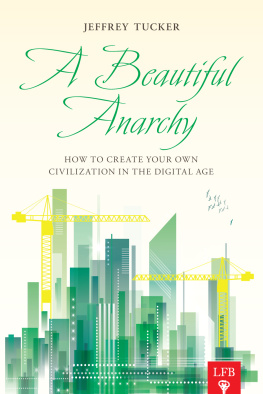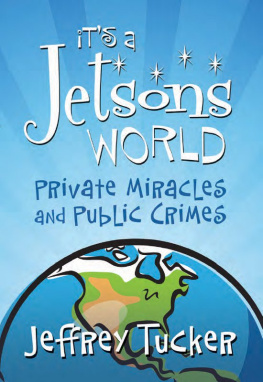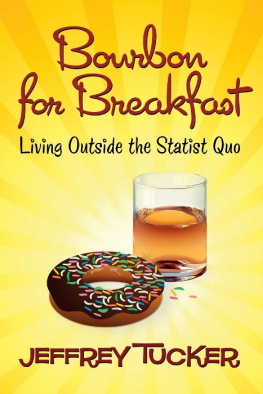Its a
Jetsons
World
Its a
Jetsons
World:
Private Miracles & Public Crimes
Jeffrey Tucker
LVMI
MISES INSTITUTE

2011 by the Ludwig von Mises Institute and published under the
Creative Commons Attribution License 3.0.
http://creativecommons.org/licenses/by/3.0/
Ludwig von Mises Institute
518 West Magnolia Avenue
Auburn, Alabama 36832
mises.org
ISBN: 978-1-61016-194-7
Contents
Preface
O NE MORNING I WAS reading about how in the past many thousands of people died from scurvy, and solely because travelers on the high seas had such limited access to fruit and vitamin C. Scurvy was documented in the ancient world, and, in the 300 years after 1500, may have killed as many as two million sailors. The fear of scurvy has been one of millions of terrifying fears that have consumed the human psyche for all of human history until very recently. Now we know and care nearly nothing about it.
That same morning, I visited a hotel breakfast buffet and there was a display of seemingly unlimited fruit and juice available for everyone, fruit of all types and from all over the world. They were in large carafes with no limit on how much people could pour. My eyes popped out in amazement and I stood thinking of the miracle and its implications, even as everyone else poured up glass after glass of whatever they wanted from the juice bar. Im quite sure that no one thought anything of it.
Whats more, should I find myself with a hankering for fruit wherever I might be traveling, I can pull out my digital device and search for a local store. The navigation tools can get me there from wherever I happen to be. When I get there, I can compare prices with all the other stores to make sure that I get the best deal, and then initiate a video call anywhere in the world and talk about how great the orange I just ate was. Then I can quickly discover the nutritional properties with a search, and even make a video of my feast and post it with a wireless device and that video can be hosted on an external site in minutes, to be watched by all my friends when I link it on a Facebook accountagain from a wireless device in my handand then this same video can become oddly popular and elicit a million views over the course of a few days. The whole thing is new. None of this would have been possible even five years ago or even twelve months ago.
Yes, there is a revolution afoot, one that is happening much more quickly than the industrial revolution. We are living in the middle of it, and yet there is a strange lack of consciousness about it. To the extent that we are conscious of it, we complain about it. We complain that there is too much food available and this tempts us to get fat. We complain about the digitization of society. We watch movies about the hidden evils of the grocery stores and wonder if the fruit was somehow sprayed with evil chemicals that are going to give us autism or cancer or something. The market economy is delivering miracles by the minute and yet we hardly notice or care; worse, we denounce the realization of this dream of all of history, this coming of heaven on earth and call it decadent and dangerous.
This is a tragedy, in my own view. We should be conscious of the cause-and-effect relationships operating in the world of human action that give rise to the globally extended order we call the market economy, an order fueled by human choices, entrepreneurship, and relentless learning and copying, and kept together by pricing signals, private property, and the freedom to trade. These institutions are what are bestowing miracles on us every day, the Jetsons world that amazes me every day.
We also need to be aware of its opposite, the gargantuan apparatus of compulsion and coercion called the state that operates on principles that are anachronistic to the core. Its principle is violence, and its contributions to the social order are prisons, economic upheaval, and war. It is lumbering, stupid, and angry as hell, and it is the main drag on the world today. The contrast with the market is overwhelming. An underlying assumption in this book is no different from that found in innumerable books of this bent: that there is nothing that the state does that either needs to be done or cannot be done better within the matrix of voluntary action and exchange. I hope my examples herein provide a compelling elucidation of this idea at work in our times.
Why is this message important? Knowledge in human history is easily lost. Humanity variously knew the cause and cure of scurvy and then the wisdom disappeared and then it had to be rediscovered again. This happened several times, and the last time the cure for scurvy was found again was as late as the twentieth century. So it is with human liberty: the truth of its organizing and productive power was known in the ancient world, but the truth keeps having to be rediscovered. This book is a contribution to the hope that the knowledge wont be lost.
Most of these essays appeared on Mises.org in their original form, and many were given great exposure from appearances on LewRockwell.com. This causes people to write and comment and then the article is revised and finally integrated into this final release. Once again, I owe an incalculable debt to co-workers at the Mises Institute, legions of bloggers, friends, family, and especially Briggs Armstrong, Lauren Barlow, Aristotle Esguerra, Doug French, Brandon Hill, Hans-Hermann Hoppe, David Hughes, Stephan Kinsella, Eric Larson, Stephanie Long, B.K. Marcus, Mary Olsen, Arlene Oost-Zinner, Lew Rockwell, Judy Thommesen, Mark Thornton, Hilary Tucker, David Veksler, the kids, among many others Ive left off the list. Then theres an endless debt to those who have gone before, but mainly Ludwig von Mises, Murray Rothbard, F.A. Hayek, Henry Hazlitt, Garet Garrett, Albert Jay Nock, and Frdric Bastiat. They all are responsible for helping me think clearly. Many of these people suffered for the cause of human liberty much more than I will in my life, and all humanity is in their debt.

Private Miracles

Its a Jetsons World
I N THE CLASSIC AND futuristic television series from 196263I admit that I adore this show and could watch every episode 100 timespeople work only a few hours a day, travel at 500 miles per hour in flying cars that go as fast as 2,500 mph, and the main job is pushing buttons. The galaxy is their home. Health care is a complete free market with extreme customer care. Technology is the best (but of course it still malfunctions and must be fixed, same as today). Business is rivalrous, prosperity is everywhere, and the state largely irrelevant except for the friendly policeman who shows up only every once in a while to check things out.
The whole scenewhich anticipated so much of the technology we have today but, strangely, not email or textingreflected the ethos of time: a love of progress and a vision of a future that stayed on course. Appropriately, it was the first show ever shown on ABC television in color instead of black and white. It was neither utopian nor dystopian. It was the best of life as we know it projected far into the future. People did not dress in uniforms or obey some dictator on a monitor in their homes. The people in the show were as fashion conscious as any American. Their food was not embedded in pill food unless they wanted it that way (same now). They had the equivalent of fast-food delivery services in their homes. The drive was always toward automation: more efficient ways of doing what needs to be done so that human energy can be saved for a more valuable purpose.
Next page
